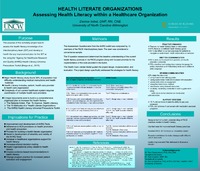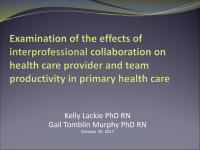Effects of conflict types and power style use among health professionals in interdisciplinary team collaboration
View File(s)
Author Information
- Author(s)
- Details
-
Dr. Deborah B. Gardner, PhD, RN
- Sigma Affiliation
- Gamma Psi at-Large
Visitor Statistics
Visits vs Downloads
Visitors - World Map
Top Visiting Countries
| Country | Visits |
|---|
Top Visiting Cities
| City | Visits |
|---|
Visits (last 6 months)
Downloads (last 6 months)
Popular Works for Gardner, Deborah B. by View
| Title | Page Views |
|---|
Popular Works for Gardner, Deborah B. by Download
| Title | Downloads |
|---|
View Citations
Citations
The citations below are meant to be used as guidelines. Patrons must make any necessary corrections before using. Pay special attention to personal names, capitalization, and dates. Always consult appropriate citation style resources for the exact formatting and punctuation guidelines.
Item Information
Item Link - Use this link for citations and online mentions.
Abstract
This research examined the effects of perceived conflict and power style use on interdisciplinary collaboration outcomes in an academic health sciences education project. Fifty-one nurse practitioner students, physician assistant students and first and second year medical students and 16 faculty who participated in the education program, Interdisciplinary Student Community Patient Education Service (ISCOPES) were studied. A comparison group of 50 (non-ISCOPES) students from the same disciplines were recruited $(N=117).$ It was hypothesized that task conflict would positively influence interdisciplinary team collaboration. Additionally, informal power styles were predicted to mediate the effects of task conflict on interdisciplinary team collaboration. Using path analysis to test a collaboration model and using qualitative content analysis from two focus groups, the following results were produced: (1) the ISCOPES experimental student and faculty groups had significantly higher scores in interdisciplinary team collaboration compared to the non-ISCOPES comparison group, (2) there was no significant difference in perceptions of interdisciplinary team collaboration based on discipline, (3) emotional conflict is a stronger negative predictor of lower interdisciplinary team collaboration than task conflict, (4) high levels of task conflict negatively predict interdisciplinary team collaboration, (5) the informal power of goodwill mediates the relationship between task conflict and interdisciplinary team collaboration, (6) the combined power styles of goodwill, authority and discipline positively effect interdisciplinary team collaboration but do not mediate conflict, and, (7) health professional faculty shape student perceptions of collaborative leadership behaviors.
Description
This dissertation has also been disseminated through the ProQuest Dissertations and Theses database. Dissertation/thesis number: 9821693; ProQuest document ID: 304483583. The author still retains copyright.
Repository Posting Date
2020-06-26T21:25:12Z
Notes
This item has not gone through this repository's peer-review process, but has been accepted by the indicated university or college in partial fulfillment of the requirements for the specified degree.
Type Information
| Type | Dissertation |
| Acquisition | Proxy-submission |
| Review Type | None: Degree-based Submission |
| Format | Text-based Document |
Category Information
| Evidence Level | Descriptive/Correlational |
| Research Approach | Mixed/Multi Method Research |
| Keywords | Interdisciplinary Collaboration; Conflict Resolution; Task Conflict |
| CINAHL Subject(s) | Collaboration; Conflict (Psychology); Interprofessional Relations; Power |
Degree Information
| Grantor | George Mason University |
| Advisor | Cary, Ann |
| Level | PhD |
| Year | 1998 |
Rights Holder
All rights reserved by the author(s) and/or publisher(s) listed in this item record unless relinquished in whole or part by a rights notation or a Creative Commons License present in this item record.
All permission requests should be directed accordingly and not to the Sigma Repository.
All submitting authors or publishers have affirmed that when using material in their work where they do not own copyright, they have obtained permission of the copyright holder prior to submission and the rights holder has been acknowledged as necessary.
Related items
Showing items related by title, author, creator and subjects.
-
Building a health literacy improvement plan with an interprofessional team
Isibel, Denise B. (2017-10-09)The purpose of this presentation is to assist a clinician or administrator to implement the AHRQ Health literacy Universal precautions Toolkit as part of improvement plan for a health literate organization. The presentation ... -
Examination of the effects of interprofessional collaboration on healthcare provider and team productivity
Lackie, Kelly A.; Murphy, Gail G. Tomblin (2017-09-20)To share research findings from a study that examined whether self-assessment for the competencies associated with interprofessional collaboration changed health care providers' understanding of interprofessional collaboration ... -
[Excerpt and supplemental materials for] Core competencies of civility in nursing & healthcare
Clark, Cynthia (Sigma Theta Tau International, 2022)This item record pertains to an excerpt from Core Competencies of Civility in Nursing & Healthcare, which is provided free of charge by the publisher. About this book: Incivility and other workplace aggressions ... -
Establishing a productive academic work environment: Implementing TeamSTEPPS in a school of nursing
Cooke, Marcia; Valentine, Nancy M.Limited information exists regarding teamwork training programs that have been developed and deployed to address incivility in the academic environment. The study outcomes from this teamwork strategy suggest improvement ... -
Multidisciplinary care: Using a simple approach to promote team-based learning and patient safety
Amann, Carol Ann; O'Toole-Baker, Valerie (2018-03-23)For years health professional education, inclusive of nursing, has occurred in silos throughout their program of study. This approach is no longer applicable to current workforce expectations. Participants will learn the ...





